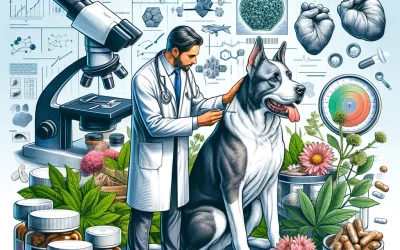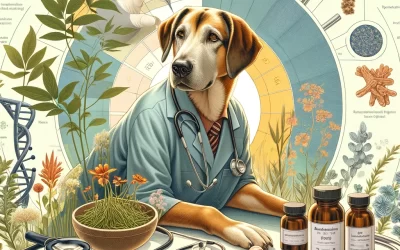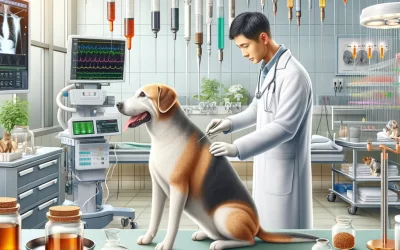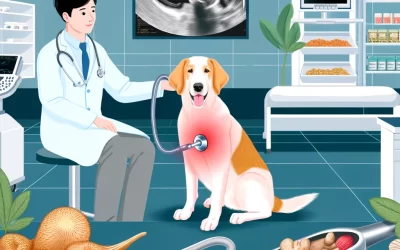Onderzoek naar de mythe van een wondermiddel tegen hondenkanker: inzichten en realiteiten
Kanker is een enorme gezondheidsuitdaging voor honden, net zoals voor mensen. Met stijgende...
De voordelen van Si Miao San voor honden ontsluiten: een holistische benadering van de gezondheid van honden
In de wereld van de holistische dierenverzorging biedt de traditionele Chinese geneeskunde (TCM) een schat aan...
Zorg voor hondenkanker: bewezen manieren om tumoren bij uw hond te verkleinen
Kanker is een enorme uitdaging, niet alleen voor mensen, maar ook voor onze honden. Het...
Groene genezing: revolutionaire Chinese kruidenstrategieën voor hondenkanker
Terwijl eigenaren van gezelschapsdieren steeds meer op zoek gaan naar holistische oplossingen voor gezondheidsproblemen, wordt de Traditionele Chinese Geneeskunde...
Oude remedies voor moderne huisdieren: traditionele Chinese kruiden om de tumorgroei bij honden te bestrijden
Wanneer bij een geliefd huisdier kanker wordt vastgesteld, begint de zoektocht naar zachte en effectieve behandelingen...
Borstkanker bij honden begrijpen en behandelen: een holistische aanpak met TCMVET BAITUXIAO
Borstkanker bij honden, ook wel borstkliertumoren genoemd, is een veel voorkomende vorm van kanker die...
Tumorgroei bij honden beheren: opties begrijpen
Als verantwoordelijke huisdiereigenaren is het van cruciaal belang om op de hoogte te blijven van mogelijke gezondheidsproblemen die...
Onderzoek naar traditionele Chinese geneeskunde: dier- en insectenremedies voor de behandeling van kanker
Traditionele Chinese Geneeskunde (TCM) omarmt al lang een holistische benadering van gezondheid, waarbij gebruik wordt gemaakt van een...
Oogkanker bij honden begrijpen: symptomen, typen en behandelingsopties
Oogkanker bij honden is een ernstige aandoening die verschillende delen van het oog en de omgeving ervan kan aantasten.
Onderzoek naar Chinese kruiden voor de behandeling van mestceltumoren bij honden zonder chemotherapie
Mastceltumoren (MCT) zijn een van de meest voorkomende vormen van kanker bij honden en vertonen een...
Kruidengeneesmiddelen ontsluiten: een hoopvolle aanpak voor het behandelen van osteosarcoom bij honden
Canine osteosarcoom is een verwoestende diagnose voor elke hondeneigenaar. Deze agressieve vorm van bot...
Navigeren door tumorbehandeling voor katten: een gids voor huisdiereigenaren
Wanneer bij een geliefde kat een tumor wordt vastgesteld, is het van cruciaal belang om te begrijpen wat de beste behandelingsopties zijn....
Kanker bij katten begrijpen: soorten, risico's en behandelingen
Inleiding Kanker bij katten is een brede term voor een reeks ziekten die, hoewel verschillend van type...
Katachtige tumoren begrijpen: symptomen, diagnose en behandelingsopties
Katten kunnen, net als mensen, lijden aan verschillende soorten tumoren, die een aanzienlijke invloed kunnen hebben op hun...
Katachtige tumoren begrijpen: veel voorkomende symptomen en recente vooruitgang in de behandeling
Omdat katten langer leven dankzij de vooruitgang in wetenschap en technologie, wordt de kans op tumoren bij katten groter.
Borsttumoren bij katten: overzicht
Borsttumoren vormen een groot gezondheidsprobleem bij oudere katten en zijn verantwoordelijk voor ongeveer 17% van alle tumoren in...
Veel voorkomende katachtige tumoren begrijpen: soorten en behandelingsopties
Kanker blijft een belangrijke doodsoorzaak bij zoogdieren, inclusief mensen en huisdieren, en presenteert...
Inzicht in de risico's van kanker bij verschillende hondenrassen: een gids voor zes rassen met een hoog risico
Kanker treft zonder onderscheid honden van alle leeftijden en rassen, maar sommige rassen zijn te wijten aan genetische...
10 Symptomen van kanker bij honden: vroege detectie kan verergering voorkomen
Wanneer mensen ziek worden, kunnen onze familieleden dat onmiddellijk merken. Honden kunnen echter niet duidelijk...
Hoe weet u of de tumor van uw hond goedaardig of kwaadaardig is: een gedetailleerde gids
Het ontdekken van een tumor bij uw geliefde hond kan alarmerend zijn. Het begrijpen van de aard van de...
Hoe u hondentumoren effectief kunt voorkomen en herkennen: een uitgebreide gids
Honden zijn niet alleen huisdieren; het zijn loyale metgezellen. Als verantwoordelijke huisdiereigenaren is het onze plicht om...
Integratieve benaderingen voor het beheer van de lipomen van uw hond
Inleiding Hoewel conventionele behandelingsopties zoals chirurgie vaak worden aanbevolen voor...
Navigeren door de lipoomdiagnose van uw hond: een gids voor huisdiereigenaren
Inleiding Het ontdekken van een lipoom bij uw hond kan verontrustend zijn. Deze goedaardige vettumoren zijn...
TCMVET Baituxiao en kankerzorg voor huisdieren
Kan TCMVET Baituxiao worden gebruikt ter ondersteuning van huisdieren die een kankerbehandeling ondergaan? Ja, TCMVET Baituxiao is...
Hoe TCMVET Baituxiao de immuniteit van huisdieren en de algehele gezondheid ondersteunt
Welke unieke ingrediënten zijn te vinden in TCMVET Baituxiao, en wat is hun rol? TCMVET Baituxiao...
Zijn er specifieke aandoeningen of huisdieren die het meeste baat hebben bij TCMVET Baituxiao?
TCMVET Baituxiao is vooral gunstig voor huisdieren die te maken hebben met verschillende soorten tumoren en...
Hoe kan TCMVET Baituxiao huisdieren helpen herstellen van een operatie of ziekte?
Herstel van een operatie of ziekte kan een uitdagende tijd zijn voor huisdieren. TCMVET Baituxiao ondersteunt...
TCMVET: Huisdierwelzijn verbeteren met traditionele Chinese diergeneeskunde
Bij TCMVET is onze missie eenvoudig maar diepgaand: het verbeteren van de gezondheid en vitaliteit van metgezellen...
Onthulling van de kracht van TCMVET Baituxiao: een holistische benadering van de gezondheid van huisdieren
Op het gebied van de verzorging van huisdieren zijn weinig dingen zo verontrustend als het getuige zijn van onze geliefde metgezellen...
Een revolutie teweegbrengen in de hondenoncologie met oude Chinese kruiden
De wereld van de hondenoncologie ondergaat een transformatieve fase met de integratie van Ancient...
Kruidentherapie integreren in de strijd tegen hondenkanker
De strijd tegen hondenkanker is voor veel huisdiereigenaren een voortdurende strijd. Terwijl conventionele...
Het antwoord van de natuur op tumoren bij honden: onderzoek naar kruidenbehandelingen
In de zoektocht naar effectieve en zachte behandelingen voor hondentumoren, eigenaren van gezelschapsdieren en dierenartsen...
De gezondheid van uw hond verbeteren: traditionele Chinese kruiden voor de bestrijding van kanker
Naarmate meer hondenbezitters natuurlijke manieren zoeken om hun harige metgezellen te ondersteunen, vooral bij het bestrijden van...
Kruidengeneesmiddelen voor hondenkanker: een veilige en effectieve aanpak
Kanker bij honden, een veel voorkomend probleem onder oudere huisdieren, stelt eigenaren van gezelschapsdieren voor grote uitdagingen...
Kruiden voor honden: een revolutie in de behandeling van mestceltumoren bij honden
In het steeds evoluerende veld van de diergeneeskunde wint een nieuwe benadering aan kracht: het gebruik...
Evenwicht tussen moderne en oude geneeskunde: Chinese kruidentherapieën voor MCT's bij honden
In de evoluerende wereld van de diergeneeskunde is de balans tussen moderne en eeuwenoude praktijken...
Een nieuwe grens in het beheer van mestceltumoren bij honden: kruidengeneeskunde
In de evoluerende wereld van de veterinaire oncologie is de behandeling van mastceltumoren bij honden (MCT's)...
Integratie van holistische zorg in veterinaire oncologie: Chinese kruiden voor hondentumoren
Het veld van de veterinaire oncologie is getuige van een paradigmaverschuiving met de integratie van holistische...
Verbetering van de behandeling van kanker bij honden: de kracht van traditionele Chinese kruiden
Kanker bij honden, een grote zorg voor zowel huisdiereigenaren als dierenartsen, vereist een uitgebreide...
Voorkomen van herhaling van mestceltumoren bij honden met Chinese kruidentherapie
Mastceltumoren (MCT's) vormen een groot gezondheidsrisico voor veel hondenrassen en het terugkeren ervan...
De rol van Chinese kruiden bij het beheersen van mestceltumorsymptomen bij honden
Mastceltumoren (MCT's) zijn een veel voorkomende vorm van kanker bij honden en het beheersen van de symptomen is een...
Versterking van de immuniteit bij honden met mestceltumoren: Chinese kruidenoplossingen
Mastceltumoren (MCT's), een veel voorkomende vorm van kanker bij honden, brengen aanzienlijke gezondheidsproblemen met zich mee....
Kruidengeneesmiddelen voor mestceltumoren bij honden: een holistische aanpak
Mastceltumoren (MCT's) bij honden zijn een grote zorg voor eigenaren van gezelschapsdieren, gekenmerkt door de...
Mestceltumoren bij honden: integratie van traditionele Chinese geneeskunde voor behandeling
Mastceltumoren (MCT's) zijn een van de meest voorkomende soorten huidkanker bij honden. Ze kunnen...
Integratie van westerse en oosterse geneeskunde voor de behandeling van mediastinale tumoren bij dieren
Het domein van de diergeneeskunde evolueert, en een van de belangrijkste ontwikkelingen is de...
Ademhalingsproblemen bij huisdieren aanpakken met Chinese kruiden: focus op mediastinale massa's
Ademhalingsproblemen bij huisdieren, vaak een symptoom van onderliggende aandoeningen zoals mediastinale massa's,...
Kruidengeneesmiddelen voor zeldzame mediastinale tumoren: gebruik maken van oude wijsheid
In het dynamische veld van de veterinaire oncologie wordt de behandeling van zeldzame mediastinale tumoren bij huisdieren...
Thymomen en lymfomen bij huisdieren: benaderingen van de traditionele Chinese geneeskunde
Als het gaat om het beheren van de gezondheid van huisdieren, met name complexe ziekten zoals thymomen en lymfomen,...
Onderzoek naar mediastinale tumoren in de diergeneeskunde: een Chinees kruidenperspectief
Op het gebied van de diergeneeskunde vertegenwoordigen de diagnose en behandeling van mediastinale tumoren een...
TCM-benaderingen van keel- en tracheale tumoren bij honden en katten
Keel- en luchtpijptumoren bij honden en katten vormen een aanzienlijke uitdaging in de veterinaire...

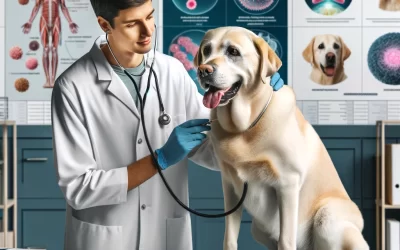







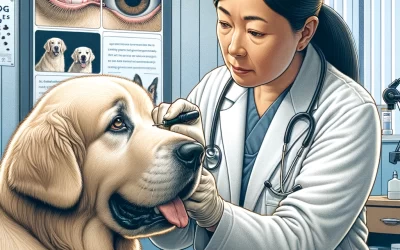


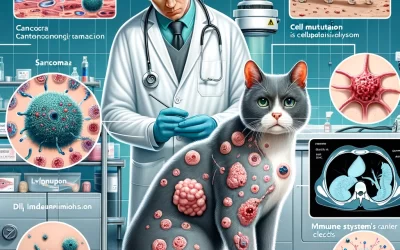

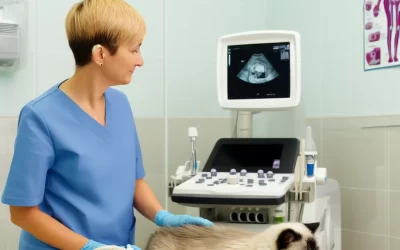
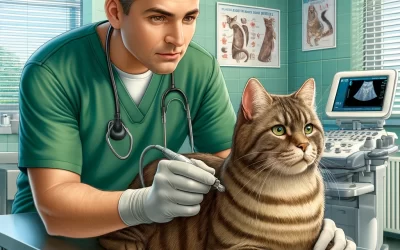

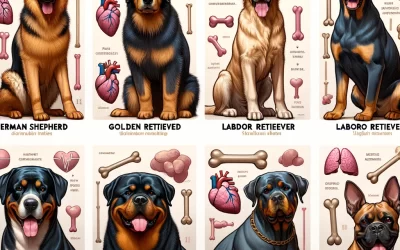
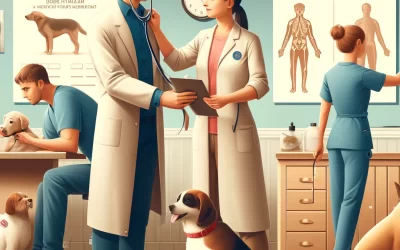
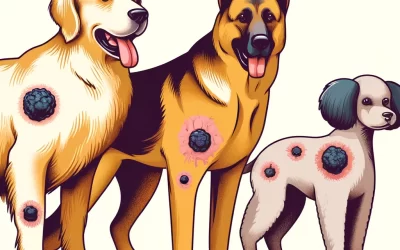



-400x250.jpg)
-400x250.jpg)
-400x250.jpg)
-400x250.jpg)









